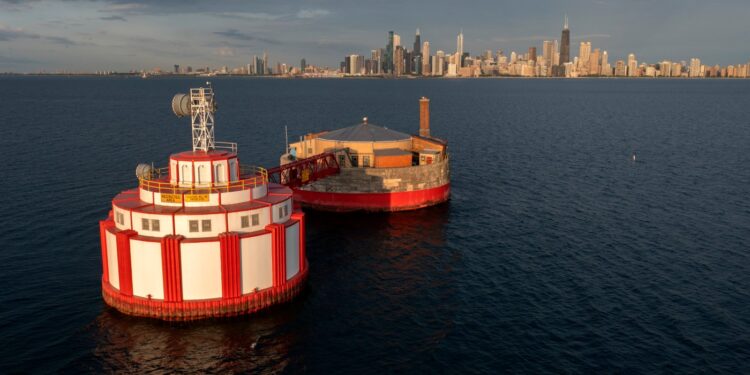
For more than two years, U.S. Environmental Protection Agency officials from Chicago have been aiding a poor, predominantly white Ohio village upended when a train derailed and spilled more than 100,000 tons of hazardous chemicals.
Vice President JD Vance, a former Ohio U.S. senator, visited the East Palestine accident site this week and vowed the EPA would finish the cleanup.
At the same time, the Trump/Vance administration is moving to fire or force out more than 20% of the agency’s Chicago staff, including officials who enforce clean air and water laws and others dedicated to helping poor communities disproportionately harmed by pollution in the Midwest.
The disconnect highlights how Trump, his aides and fellow Republicans in Congress repeatedly attempt to gut environmental protections while promising to guarantee that Americans have clean air and water.
“They say they want to bring EPA back to its core mission,” said Nicole Cantello, president of the union for about 1,000 agency employees in Chicago. “But how do you protect health and the environment if they constantly undermine us?”
The EPA’s Midwest office traditionally has been one of the agency’s biggest and busiest, prosecuting companies that pollute the air, water and land in Illinois, Ohio and four other states around the Great Lakes.
Trump purged dozens of career officials in the Chicago office during his first term. His latest attempt to cull the workforce is led by billionaire Elon Musk, whose companies Tesla and SpaceX have been fined by the EPA for multiple violations of environmental laws.
“Elon Musk wants to turn EPA into every polluter’s ally,” U.S. Sen. Edward Markey, a Massachusetts Democrat, said Thursday at a rally in front of the agency’s headquarters. “He wants to take environmental cops off the beat.”
History suggests Musk and scores of other polluters are going to catch a break during the next four years.
Water pollution cases filed by the EPA in the Great Lakes region declined during each of the first three years Trump was president, according to an analysis of agency records by the nonprofit Environmental Law and Policy Center.
Meanwhile, the number of chronic violators of the Clean Water Act in the heavily industrialized states skyrocketed under Trump, who as a candidate in 2016 vowed to abolish the EPA.
Among other things, Trump appointees declined to punish U.S. Steel when career EPA staff confirmed the company had repeatedly, and illegally, released harmful pollution into Lake Michigan, the Chicago area’s chief source of drinking water.
The Trump EPA brokered a settlement with U.S. Steel only after a threatened lawsuit from the Abrams Environmental Law Clinic at the University of Chicago.
It took another threatened lawsuit from the Environmental Law and Policy Center to force more rigorous scrutiny of the northwest Indiana steel mill now owned by the Cleveland-Cliffs conglomerate. The mill had dumped fish-killing ammonia and cyanide into a Lake Michigan tributary.
During Trump’s first term, the EPA was led by Scott Pruitt, a former Oklahoma attorney general who repeatedly sued to block clean air and water regulations, and Andrew Wheeler, a coal industry lobbyist.
Pruitt and Wheeler said during Trump’s first term that it was up to states to decide which environment and public health initiatives should be a priority. At the same time, the Trump White House proposed deep cuts in federal grants that account for a large share of the funding for state environmental programs.
The latest Trump appointee to lead the EPA, former New York lawmaker Lee Zeldin, has frozen billions of dollars of EPA grants funded by laws enacted by Congress, in particular money set aside to slow climate change and encourage the use of electric vehicles.
Zeldin, like all other congressional Republicans, voted against the 2022 Inflation Reduction Act intended to boost renewable energy and clean manufacturing in the U.S.
At his Jan. 16 confirmation hearing, Zeldin said he plans collaborate with industry “to promote common-sense, smart regulation that will allow American innovation to continue to lead the world.”
He vowed that under his leadership the EPA “will prioritize compliance as much as possible. I believe in the rule of law and I want to work with people to ensure they do their part to protect the environment.”
One of Zeldin’s deputies spent the first Trump term attempting to block more stringent regulation of chemicals, including cancer-causing PFAS — per- and polyfluoroalkyl substances — found in the blood of nearly every American, and ethylene oxide, a highly toxic gas used to make plastics and sterilize medical devices.
Nancy B. Beck formerly worked for the American Chemistry Council, the industry’s chief trade group. She has testified before Congress in favor of Republican-sponsored legislation that would effectively make it more difficult to restrict PFAS, ethylene oxide and other chemicals.
The chemical industry trade group is suing to block PFAS and ethylene oxide regulations adopted during the Biden administration.
More than 8 million people in Illinois get their drinking water from a utility where at least one PFAS has been detected, a 2022 Chicago Tribune investigation found. The discovery of high levels of ethylene oxide pollution led to the closure of a sterilization plant in southwest suburban Willowbrook and prompted a state law requiring another facility in north suburban Waukegan to dramatically reduce emissions.
Back in East Palestine, Ohio, Vance this week blamed Democrats for failing to enact legislation intended to prevent more disastrous trail derailments.
Several Republican senators opposed the bill, as did most of their colleagues in the Republican-controlled House.
Originally Published:







